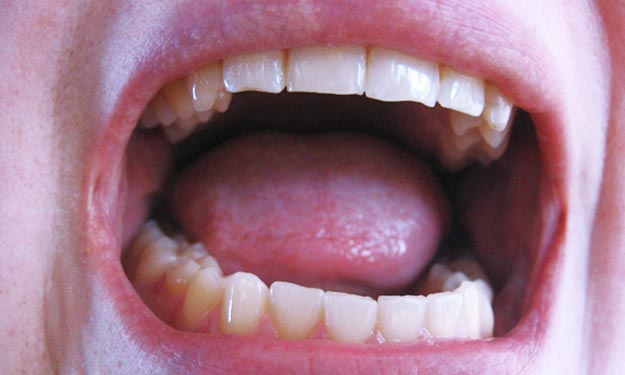Gum disease
Gum disease (periodontal disease) is the infection of the tissues and bones supporting the teeth. It is estimated that around 80% of the population has some form of gum disease. Gum disease is usually caused by the buildup of dental plaques on the surface of the teeth and beneath the gum line.
Plaque is a biofilm that contains bacteria. The bacteria produce toxins and cause inflammation and damage to your tissues. It's important to regularly remove plaque because if left untreated, it can lead to gum inflammation, bleeding, and dental problems like cavities and periodontal issues.
Gum disease usually begins as gingivitis, a mild inflammation of the gums characterized by swelling and reddening of the gum tissues. If left untreated, gingivitis may progress to periodontitis.
Periodontitis destroys the bone surrounding and holding the teeth in their place. Progressive destruction of the bone results in the receding of gums, mobility of the teeth, and tooth loss. Some studies show that periodontitis may cause the development of different chronic medical conditions, such as diabetes, obesity, and arthritis.
Natural Cures for Gum Disease
Remember, while these home remedies may help alleviate the symptoms of gingivitis, they do not substitute professional dental care. It's essential to visit a dentist for a comprehensive evaluation and appropriate treatment to address the underlying causes of gingivitis.
Good Oral Hygiene
Good oral hygiene is the best home remedy for gum disease.
- Regular and thorough teeth, gums, and tongue brushing at least twice daily using a soft-bristled toothbrush and fluoride toothpaste. Make sure to brush gently along the gumline.
- Use fluoridated toothpaste and change your toothbrush every three months.
- Floss regularly, at least once daily, to remove plaque and food particles between your teeth.
Salt Water Rinse
A salt water rinse is an excellent way to reduce tissue inflammation and gum puffiness. Results should be almost immediate. A salt water rinse can be done several times a day. Rinsing with salt water is not a substitute for good oral hygiene.
- Mix one tablespoon of salt into 1 cup of warm water.
- Make sure the salt has dissolved thoroughly.
- Sip, swish thoroughly, and spit the water into the sink.
- Do not swallow the saltwater mixture. Continue rinsing mouth until salt water is gone.
Vitamin C
Vitamin C is a natural oxidant that removes free radicals, damaging gum tissues. Vitamin C is also needed to repair and build healthy connective tissues and to increase bone regeneration, increasing the healing of damaged gum tissues.
Grapefruit, oranges, broccoli, cantaloupes, strawberries, kiwifruit, and Brussels sprouts are rich in Vitamin C. Smokers are recommended to increase their Vitamin C intake.
Oil Pulling
A centuries-old Ayurvedic technique known as oil pulling can effectively eliminate toxins and enhance oral health. Swish one tablespoon of coconut or sesame oil around your mouth for 5-10 minutes. Afterward, spit it out and rinse your mouth with water.
Tea Tree Oil
Tea tree oil is a popular home remedy for gum disease. Tea tree oil relieves bleeding gums, gum recession, and bad breath. It also contains antibiotic properties, which help in fighting gum-disease-causing bacteria.
Add a few drops of tea tree oil to your toothbrush, then brush your teeth as usual. Tea tree oil gel toothpaste is also a natural cure for gum disease. Make sure not to swallow tea tree oil but spit it into the sink as you do with regular toothpaste.
Herbal Mouthwashes
Herbal mouthwashes containing peppermint, tea tree oil, or echinacea relieve gum inflammation and irritation. Dilute a few drops of these essential oils in water and use the mixture as a mouthwash after brushing your teeth.
You can make a tea tree oil mouthwash by adding five drops to a cup of warm water and rinsing your mouth as you would with the salt water rinse above. Tea tree oil doesn't taste or smell very good but has antiseptic properties. Make sure to mention your usage of it to your doctor or dentist before using it, as it may interact with certain medications.
Aloe Vera Gel
To help calm inflamed gums, try massaging a small amount of pure aloe vera gel onto them. Aloe vera is known for its anti-inflammatory and antimicrobial properties, making it a helpful solution.
Turmeric Paste
Turmeric has natural anti-inflammatory and antimicrobial properties. Mix turmeric powder with a small amount of water to create a paste and apply it directly to your gums. After leaving it on for a few minutes, rinse your mouth thoroughly.



